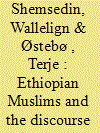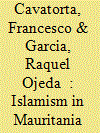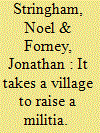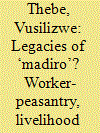|
|
|
Sort Order |
|
|
|
Items / Page
|
|
|
|
|
|
|
| Srl | Item |
| 1 |
ID:
154241


|
|
|
|
|
| Summary/Abstract |
This article examines the Task Forces created by the African Union (AU) to address the security threats posed by Boko Haram and the Lord's Resistance Army (LRA). It argues that these Task Forces are well suited to address transnational armed groups whose ambiguous political goals and extreme violence make traditional conflict resolution ineffective. Although the Task Forces fall within the AU's collective security mandate and broadly within the African Peace and Security Architecture (APSA), their distinct characteristics make it more capable of addressing these new cross-border threats. Their reliance on nationally funded and directed militaries also allow the Task Forces to fulfil both the goals of the AU and the interests of the regimes that take leadership roles within these structures.
|
|
|
|
|
|
|
|
|
|
|
|
|
|
|
|
| 2 |
ID:
154238


|
|
|
|
|
| Summary/Abstract |
This article provides insights into particular aspects of contemporary Islamic reformism in Ethiopia, focusing on what we have labelled the Intellectualist movement. Analysing the trajectory and the ideological underpinnings of the movement from the early 1990s to the present, the study interrogates the assertion that Ethiopian Islam has moved in a radical direction and argues that the Intellectualist movement has been a significant force moderating the domestic political-religious discourses. We demonstrate that it contributed to the production of political awareness among generations of young Ethiopian Muslims, which rather than contesting the existing political system, moved in a direction of a strengthened belief in secularism and democratic values. What is important here is that this took place in an increasingly constraining political environment, which, as often assumed, did not trigger any reaction of radicalization, but rather reinforced the adherence to a moderating discourse.
|
|
|
|
|
|
|
|
|
|
|
|
|
|
|
|
| 3 |
ID:
154242


|
|
|
|
|
| Summary/Abstract |
The rise of Islamism following the Arab Spring has renewed interest in the democratic credibility of Islamist parties and movements. Focusing on the case of Mauritania's Islamists this article analyses the validity of the moderation hypothesis and argues that for some Islamist parties, moderation, when historically situated, has always been a key trait. The case of Mauritanian Islamism is interesting because it takes place within an intellectual and geographical place that straddles both the Arab world and sub-Saharan Africa, therefore providing insights on how Islamism has become an influential ideological framework in both worlds, that are much less separate than superficially believed.
|
|
|
|
|
|
|
|
|
|
|
|
|
|
|
|
| 4 |
ID:
154235


|
|
|
|
|
| Summary/Abstract |
Why does South Sudan continue to experience endemic, low intensity conflicts punctuated by catastrophic civil wars? Reporters and analysts often mischaracterise conflicts in the young country of South Sudan as products of divisive ‘tribal’ or ‘ethnic’ rivalries and political competition over oil wealth. More nuanced analyses by regional experts have focused almost exclusively on infighting among elite politicians and military officers based in Juba and other major cities who use patronage networks to ethnicise conflicts. This paper argues instead that civilian militias known as the Nuer White Army have consistently rebelled against elites who they blame for mounting inequalities between urban areas and the rural communities regardless of their ethnicity. While unable to stop governments and NGOs from funnelling almost all their resources to the cities, these militias have consistently mobilised local resources for violent campaigns that redistribute wealth by pillaging urban areas.
|
|
|
|
|
|
|
|
|
|
|
|
|
|
|
|
| 5 |
ID:
154237


|
|
|
|
|
| Summary/Abstract |
This paper examines acts of land ‘self-provisioning’ (‘siziphile’ land occupations) and ‘radical land restitution’ (of land previously annexed from people by the local authority for a pilot grazing project) by villagers in a communal area in Lupane District in north-western Zimbabwe. Situating these occurrences within the wider and historical context of ‘madiro’ (freedom farming and unauthorised development of settlements) and Matabeleland land politics and semi-proletarianisation, it stresses the livelihood history of households, the disappointments with local job opportunities and destruction of urban-based livelihoods in a crumbling economy, and the accompanying crisis of communal area agriculture. It concludes that these factors provided a real threat to semi-proletarianisation. By self-provisioning of the land the overriding concern of villagers was to maintain a certain level of livelihood survival, even if it was at odds with their livelihood strategies, while they sought opportunities to maintain semi-proletarianisation.
|
|
|
|
|
|
|
|
|
|
|
|
|
|
|
|
| 6 |
ID:
154240


|
|
|
|
|
| Summary/Abstract |
This paper explores tensions over scale and viability in irrigated agricultural development in Tanzania. A revival of ambition to transform African agriculture has reawakened debate over what type of agriculture can best deliver increased production and poverty reduction for rural populations. This paper examines these debates through the lens of an ethnographic study of an irrigated rice farm in Tanzania. With a chequered history of state and donor intervention management, Dakawa, Rice Farm in Mvomero District is now collectively farmed by a cooperative society of ‘small farmers’. It is widely hailed as a success, both of irrigation production, and of ‘small farmers’ in delivering this. However, such narratives of smallness and success obscure a more complex reality in which smallness of scale may be more of a discursive tool than a reflection of empirical reality. Although notions of ‘viability’ and ‘success’ in such development interventions are themselves also contested and depend on perspective, there is evidence that there are fundamental problems of both short- and long-term viability.
|
|
|
|
|
|
|
|
|
|
|
|
|
|
|
|
|
|
|
|
|